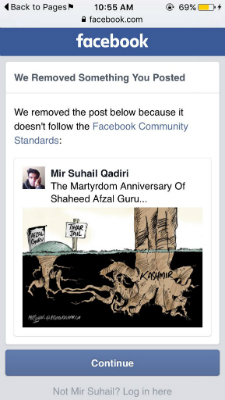
Srinagar: Last week, a budding Kashmiri cartoonist working with the daily Rising Kashmir became news after social networking platform Facebook removed his cartoon. Mir Suhail had drawn a cartoon depicting roots beneath Parliament attack convict Afzal Guru’s grave in Tihar jail connecting with roots of a large tree, Kashmir. The social media giant Facebook removed the cartoon prompting the issue to hog headlines while underlining the restrictions on freedom of expression in cyberspace as well.
Suhail had received a notification on Tuesday morning from Facebook that his account-both his official fan page, which has as many as 32,000 followers, and personal account-had been blocked because “it did not follow Facebook community standards”.

“I was expecting this move from the Facebook as some people don’t want the reality of Kashmir be known outside. My artwork was removed and I was barred from posting or chatting on the FB for 24-hours,” Suhail told the Hoot.
After the 24-hours timeframe, he had again posted the cartoon along with the screenshot of the Facebook post prompting the FB to block him since then.
“As an artist, I too wanted to highlight Afzal Guru through my cartoon on his third anniversary. But the censorship reflects how Kashmir is being censored from social media too. My work reflects the collective voice and removing my work means FB is ignoring my community,” he said.
However, the censorship is a “learning process” for Suhail, who believes relying too much on the social networking platform is a mistake.
Facebook had cited that it “removes any comments that praise or support terrorist groups or their actions”. The removal of the content drew sharp reaction from netizens by bringing the debate on free speech into public domain again. In the Valley, it was the first episode on the social networking website that furthered evidence that free speech too was being muffled by soft censorship.
Kashmir has been in the grip of censorship from both sides in the last two-and-half-decades of conflict. In the 1990’s, the writ of the militant groups was prevalent while in the past decade the government’s writ runs large over media outlets. If some newspaper tries to take on government (which rarely happens), it has to fend for itself. The government’s Information department, which is often headed by the Chief Minister, blacklists the newspaper for advertisements. In a way, the government resorts to blackmail thereby making newspapers fall in line.
Earlier, the Jammu and Kashmir police would monitor the social platform and nail the online user who would express pro-independence or anti-India sentiment. However, it is being sensed that social networking platform, which boasts of greater freedom of speech, is acting on the direction of government.
“Earlier, I would rely on the platform because of its reach but after the censorship episode, I don’t trust it anymore. I had posted my precious work posted on Facebook till now but I am reluctant to do so anymore because it’s being monitored and ones privacy is at risk,” he added.
The head of the Department of Journalism and Mass communication Dr Ruheela Hassan, at Kashmir’s Islamic University of Science and Technology, said it is clearly a violation but the larger question is ‘has it happened under the influence of anyone else’.
“It’s a violation of freedom of speech and expression especially when cyber space has no geographical boundary. If a person doesn’t like political ideology or content of another, it doesn’t mean one has right to block or remove the particular content,” Ruheela said.
Resident Editor Najeeb Mubarki of the daily Kashmir Reader, however, said it was not clear if the cartoon was pulled down on the state’s complaint or anyone else’s.
“It’s unclear whether it was a state complaint or complaint by assorted groups including some sections of Kashmiri Pandits or rightwing groups. But by any measure of expression, the cartoon was not objectionable,” said Mubarki.
He termed censoring of the cartoon as “double-repression” that happens in authoritarian regimes.
“Journalists, artists and academicians have become easy victims for double repression, that is repression against them if they protest against (often physical) repression elsewhere. It reflects extreme intolerance,” he added.
Cyber Law expert and Advocate Supreme Court of India Karnika Seth said the Facebook’s move of blocking the cartoon could be challenged but it’s up to courts to interpret whether it is “indeed illegal or curtails freedom of speech” as was done in Aseem Trivedi’s cartoon case.
“From an objective stand point, it links Afzal Guru with Kashmir and its roots, it may be considered as likely to enrage public religious sentiments. Particularly, in light of current volatile environment over JNU issue in India,” Karnika said.
(Moazum Mohammad reports for the Kashmir Reader. He has previously worked for the Pioneer and the Millennium Post.)
http://www.thehoot.org/media-watch/digital-media/facebooks-censorship-9173